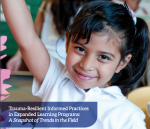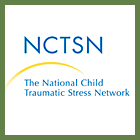Trauma-Informed Care
- ACEs (23)
This Trauma-Informed SEL Toolkit has been created by Transforming Education and is a 120-minute professional development session designed for educators seeking research-based strategies to create a healthy classroom environment for students who have experienced adversities and trauma.
Occupational therapists and trauma-informed teachers weigh in on how to create sensory tools and spaces with what you have at home.
Trauma-Resilient Informed Practices in Expanded Learning Programs: A Snapshot of Trends in the Field
The mission of the Region 11 Expanded Learning Technical Assistance Unit is to build and strengthen the Expanded Learning Programs’ (ELPs’) capacity to develop, implement, and sustain high-quality year-round programming (before school, after school, intersession, and summer).
About LA’s BEST Afterschool Enrichment Program
LA’s BEST Afterschool Enrichment Program plays a vital role in the lives of more than 25,000 unique and talented elementary school students who come from neighborhoods with the fewest resources and the greatest needs. LA’s BEST engages children creatively, emotionally, intellectually, and physically, empowering them to explore and discover the opportunities in their lives. We inspire and prepare children to create lives full of choices
The Trauma and Learning Policy Initiative’s (TLPI) mission is to ensure that children traumatized by exposure to family violence and other adverse childhood experiences succeed in school. To accomplish this mission, TLPI engages in a host of advocacy strategies including: providing support to schools to become trauma-sensitive environments; research and report writing; legislative and administrative advocacy for laws, regulations, and policies that support schools to develop trauma-sensitive environments; coalition building; outreach and education; and limited individual case representation in special education where a child’s traumatic experiences are interfacing with his or her disabilities.
This report from Child Trends and the National Center for Children in Poverty includes a review of the prevalence of early childhood trauma and its effects. The report offers promising strategies for child care and preschool programs looking to help young children who have endured trauma, and presents recommendations for policymakers to support trauma-informed early care.
Established by Congress in 2000, the National Child Traumatic Stress Network (NCTSN) brings a singular and comprehensive focus to childhood trauma. NCTSN’s collaboration of frontline providers, researchers, and families is committed to raising the standard of care while increasing access to services. Combining knowledge of child development, expertise in the full range of child traumatic experiences, and dedication to evidence-based practices, the NCTSN changes the course of children’s lives by changing the course of their care.
Bright Horizons Director Brendamarie Contreras shares tips on how to talk to young children about the Boston Marathon bombings.
This article gives educators five ways to help students in trauma.
This article is about how teachers help students who’ve survived trauma.
Spot signs of trauma, and learn how you can help.
This article is about “how trauma is changing children’s brains”.
After tragedies, kids will have questions. How do we respond?










